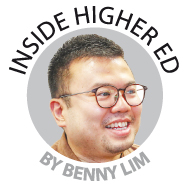ALL higher education institutions, public or private, are obliged to provide quality education. Apart from quality assurance, the for-profit nature of many private higher education institutions in Malaysia (IPTS) also indicates their need to ensure profitability to sustain and grow.
Gone are the days where the barriers to enter IPTS were low. Over the years, the Malaysian Qualifications Agency has defined the requirements of academic staff for various disciplines through the implementation of programme standards. It is presumptuous to still subscribe to the dichotomy of academia and industry, and think that teaching is only for those who cannot make it in the industry.
In the last decade, the saturated IPTS sector has been confronted with the drastic shrink in local students’ market. The Covid-19 pandemic is only going to worsen the already unfavourable situation.
As expected, many opinion pieces on the difficulties faced by IPTS have come up since the introduction of the movement control order (MCO) on March 18.
Public institutions have been advised by the Higher Education Ministry to delay their coming semesters. IPTS, on the other hand, are faced with a Catch-22 situation, as postponing semesters could result in a financial catastrophe. To rub salt into the wound, April is the month with the highest enrolment numbers for most IPTS.
In the absence of a stimulus package to support the sector, the fear of being laid off continues to linger among IPTS colleagues, in spite of the government discouraging companies to retrench and cut salaries of their employees during this trying time.
Academics should take this time at home to contemplate the outlook of the sector, and develop action plans to better prep themselves to contribute to the likely future.
The IPTS sector is supported by 23,000 academic staff. Official statistics show that only 21.1% of academic staff in IPTS have doctoral degrees, while another 52.3% hold Master’s degrees as their highest qualification. The bulk of the doctoral degree holders are likely to concentrate in private universities, with a sizeable number taking on administrative leadership roles.
This is definitely the time for academicians to upskill and upgrade their qualifications. While a doctoral degree does not necessarily guarantee success, it opens up opportunities for promotions and mobility.
Academic disciplines are becoming increasingly integrative. In the coming years, IPTS will be expected to be more innovative and forward thinking in their offerings, so as to prepare students for both current and future employment.
One should consider doctoral programmes that cater to interdisciplinary research, rather than a rigid, fixed discipline. There’s also a growing trend for those already with doctoral qualifications to undertake another postgraduate qualification, mostly at master’s level, outside of their original field to explore new synergies across different disciplines.
In my first column, “The future is virtual”, March 5), I argued that online higher education would gain acceptance over time. Teaching and learning activities would also categorically be reshaped by technology.
As the MCO continues to be enforced, the doors of higher education institutions remain shut. Within a short few weeks, lecturers have adapted to online teaching and assessments with minimal training. Cultural lags aside, online learning seems to be the new norm, at least for the coming months.
Yet, mastering a range of communication technologies does not necessarily translate to expertise in the field of online education. For one, delivery technology changes and evolves over time. Academics have to become what Spanish sociologist Manuel Castells describes as “a self-programmable labour”, who is ready to take on new tasks and challenges in this network society.
In time to come, one might teach online for a few universities in different geographical locations. Research assignments could be guided virtually by supervisors from any location. Demand for curriculum developers specialising in online distance learning is also expected to grow. These are not imaginations, but new possibilities.
IPTS are usually teaching institutions, and academics are assigned heavy teaching loads with limited resources for research. Yet, a strong research portfolio has direct implications on one’s mobility.
Opportunities for research can stem from one’s daily classes. In preparing and delivering a certain subject, gaps identified could be further expanded into exploratory research. Academics teaching skill-centric modules can collaborate with their students to embark on practice-based research.
For the remainder of 2020 (maybe even the first half of 2021), many international conferences are likely to be virtual. For academics with limited research support, this is a favourable time to enhance one’s conference participations and networking through virtual paper presentations.
Social media, such as LinkedIn, is especially useful for academics to build international networks. Connect with academics who have good experience in the online higher education sphere, and follow their posts and chain of thought. Academics should also post regular short research articles and opinions on the platform to establish one’s self-branding.
Drawing reference from French sociologist Pierre Bourdieu, academics need to build their social and cultural capital to develop resilience, definitely more so now than before. Above all, this resilience must also consist of one’s love and passion for education.
Those who can, teach!
Associate Professor Dr Benny Lim is the Dean of Faculty of Liberal Arts, and the Acting Dean of Faculty of Hospitality and Tourism, Berjaya University College. The views expressed in this article are his own and do not represent the university he is associated with.









